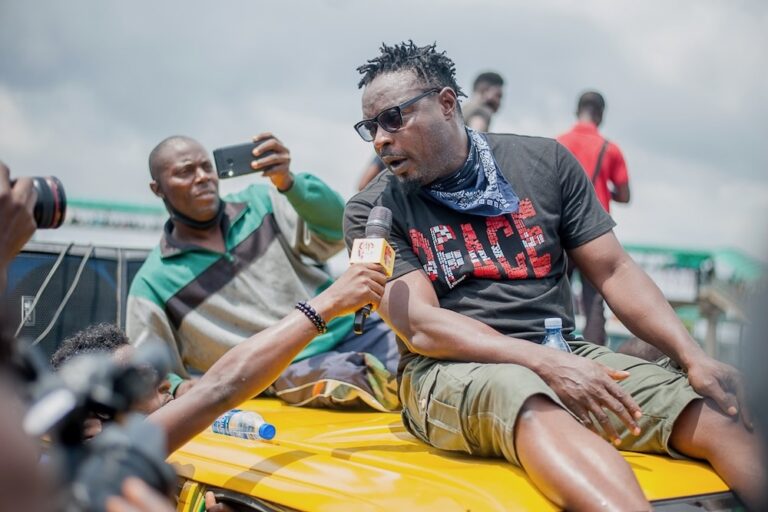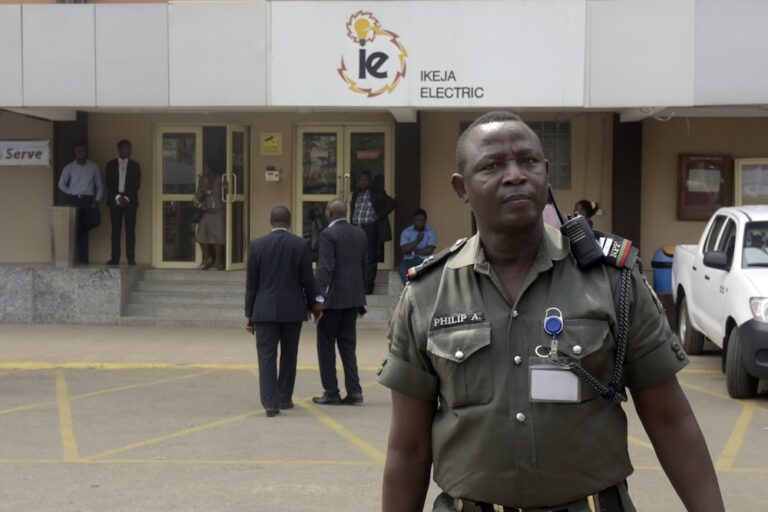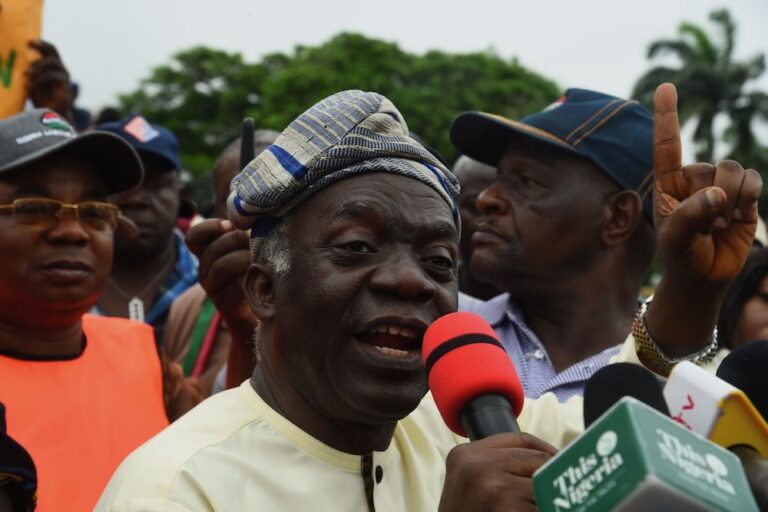The following is a letter ARTICLE 19 is sending to Nigeria, with copies to the United Nations, the European Union, Commonwealth leaders and the Organisation of African Unity, among others, to mark the anniversary on 12 June of the annulled elections in Nigeria. ARTICLE 19 encourages others to copy, adapt or modify this letter in […]
The following is a letter ARTICLE 19 is sending to Nigeria, with
copies to the United Nations, the European Union, Commonwealth
leaders and the Organisation of African Unity, among others, to
mark the anniversary on 12 June of the annulled elections in
Nigeria. ARTICLE 19 encourages others to copy, adapt or modify
this letter in whatever way to send to their own governments and
other contacts. Names and fax numbers of people to fax copies of
this letter prior to 12 June are included below.
** ** **
4 June 1996
General Sani Abacha
Head of State
State House
Abuja, Nigeria
ARTICLE 19, the International Centre Against Censorship, is
greatly concerned about continuing human rights violations in
Nigeria and by your government’s failure to respect the
democratic wishes of the Nigerian people as expressed in the
Presidential elections held in June 1993. That election, was won
by Chief Moshood Abiola: it should have resulted in his elevation
to the Presidency whereas, instead, two years after he publicly
declared himself Head of State, he continues to languish in
prison on treason charges, which carry a possible death sentence,
despite court orders granting him bail. His health continues to
suffer and there are grave fears for his safety.
The three years since you assumed power have witnessed an
unprecedented attack on the institutions of civil society in
Nigeria. They have been marked too by a pattern of gross and
systematic human rights violations in which the principal targets
have included writers and the press, organized labour and trade
unionists, environmental and minority activists, pro- democracy
leaders and human rights defenders. The right to freedom of
expression, the cornerstone of democracy and government
accountability, and an essential prerequisite for the protection
of other basic human rights, has been systematically violated in
flagrant disregard of Nigeria’s treaty obligations as a party to
the International Covenant on Civil and Political Rights and the
African Charter on Human and Peoples’ Rights. At the same time,
while utilising the name of law to detain, imprison and, in the
worst cases, execute its critics, in practice your government has
treated the independence of the judiciary with contempt and has
all but abandoned the rule of law.
As an international human rights organization committed to the
protection and promotion of freedom of expression, we are
particularly concerned about the following:
1. The continuing detention of at least 19 members of the Ogoni
ethnic group allegedly in connection with the killings of four
Ogoni notables at Giokoo on 21 May 1994 and the possibility that
they may be brought to trial before the same Civil Disturbances
Special Tribunal (CDST) which was used to convict Ken Saro-Wiwa
and eight others prior to their executions in November 1995. The
CDST is neither an independent nor an impartial court, and its
conduct of, and verdict in, the earlier Ogoni trials was a
travesty of justice.
The Tribunal should be immediately discontinued and the 19 Ogoni
reported to be held awaiting trial in connection with the May
1994 killings should be released. International human rights
standards to which Nigeria is a party require that all persons
have a right to a fair trial within a reasonable time which,
given the duration of their detention to date and the wider
circumstances surrounding events in Ogoniland, is clearly no
longer possible in this case.
2. The imprisonment of some 43 people, including serving military
personnel and civilians, after their trial by secret military
tribunal in 1995. Among those imprisoned are the former head of
state and his deputy, General Olusegun Obasanjo and Major-General
Shehu Musa Yar’Adua, the chairman of the Campaign for Democracy,
Dr Beko Ransome-Kuti, and four journalists, Christine Anyanwu,
Kunle Ajibade, George Mbah and Ben Charles Obi.
These trials were connected with an alleged military coup
attempt. It is questionable whether any such attempt actually
took place and indubitable that the trial of those accused of
involvement failed to meet the most basic standards of fairness
under international law, since they were held in secret and
before an administrative tribunal; some defendants were tortured;
they were not informed of the charges against them; they did not
have lawyers of their choice; and they had no right of appeal.
We welcome your decision last October to commute the sentences of
those facing the death penalty and to reduce some other
sentences. However, we consider that the continued imprisonment
of these 43 remains an affront to the right to freedom of
expression and an act of defiance to the rule of law. In the case
of Dr Ransome-Kuti, the Federal High Court in Lagos ordered the
tribunal not to proceed with the prosecution. Yet Dr Ransome-Kuti
had already been sentenced in secret and your government chose to
ignore the High Court order.
We urge that you release them immediately and unconditionally.
3. The protracted imprisonment of Chief Moshood Abiola has
implications not only for the exercise of his own individual
rights, but also for the transition to democracy in Nigeria. The
failure of the prosecution to bring the case to court two years
after Chief Abiola’s arrest (and after numerous legal challenges
to the terms and legality of his imprisonment) suggests a
contempt both for the rights and well-being of the prisoner and
the expectations of millions of Nigerians who voted for him in
1993.
We urge that he too should be released promptly and without
conditions.
4. The State Security (Detention of Persons) Decree No. 2 of
1984, amended by Decree No. 11 of 1994, has been used to detain
thousands of Nigerians who have voiced their objections to the
continuation of military rule. Despite the requirement that cases
be reviewed after three months, your government, like its
predecessors, appears to regard detention orders issued under
this decree as infinitely renewable. Among those currently
detained without charge or trial are a number of prominent
critics of military rule, including Chief Gani Fawehinmi,
arrested on 30 January 1996, Femi Falana, arrested on 14 February
1996, Chief G.A. Dabibi, arrested on 21 January 1996, and Femi
Aborisade, arrested on 14 February 1996. Reports indicate that
they are among some 200 people currently detained for political
reasons. We consider this an unacceptable breach of their right
to freedom of expression and their right not to be subjected to
arbitrary arrest and detention. Their imprisonment is not
regulated by any of the normal processes of law — the right of
habeas corpus having been suspended by military decree.
They too must be released immediately and unconditionally.
5. Nigeria has a long and honourable tradition of freedom of the
press. However, in recent years this has come under serious and
sustained threat. Since the late 1980s banning orders have been
issued against more than 30 newspapers and magazines, a process
which has accelerated since 1993, with the promulgation of a
decree requiring tighter state licensing of the independent
press. The one-year bans on the titles Guardian, Concord and
Punch groups were pursuant to this decree.
But perhaps even more chilling is the escalation of physical
threats to the press, journalists and publishers. The four
journalists imprisoned by military tribunal in 1995 are held for
having revealed details of the tribunal’s earlier proceedings.
Nosa Igiebor, editor of Tell, was detained in December 1995. Days
later, the offices of The News and Tempo were hit by an arson
attack. In February 1996 Chief Alex Ibru, publisher of the
Guardian newspaper group, narrowly survived an assassination
attempt. The frequency of legal or quasi-legal moves against the
press casts serious doubt on your government’s attempt to
describe outrages such as the attack on Chief Ibru as purely
criminal in intent. No serious observer of the Nigerian scene
doubts that the press is under attack principally because of its
persistence in seeking to uncover official abuses.
Nor are such restrictions limited to Nigerian journalists,
although they suffer the worst. The recent arrests of Paul Adams
of the London Financial Times and Hilary Anderson of the British
Broadcasting Corporation appear to be attempts to intimidate the
foreign press corps in order to modify Nigeria’s poor
international image.
As organizations deeply concerned with issues of press freedom,
we believe that this image could best, and most rapidly, be
improved by the repeal of decrees restricting press freedom, the
release of imprisoned journalists and the establishment of an
impartial and independent judicial investigation into attacks on
the press, including the assassination attempt on Chief Ibru and
the fire-bombing of newspaper offices.
We urge your government to take immediate steps to remedy these
gross abuses, to respect human rights and to return Nigeria to
democratic rule without delay. We believe that the international
community as a whole must also insist that you take such action,
and must be prepared to take all appropriate measures to ensure
that you do so — and must hold you and other members of your
government personally liable for the safety of Chief Abiola, the
Ogoni 19 and others currently imprisoned or otherwise at risk in
Nigeria for the peaceful expression of their right to freedom of
expression.
Frances D’Souza Executive Director
Appeals To
General Sani Abacha
Chairman of the Provisional Ruling Council
and Commander-in-Chief of the Armed Forces
Fax: +234 95 232 138
President Robert Mugabe
Harare, Zimbabwe
Fax: +263 470 5161
Stan Mudenge
Foreign Minister
Harare, Zimbabwe
Fax: + 263 470 5161
The Honourable Seymour Mullins
Foreign Minister
Jamaica
Fax: +809 929 6733
Abid Hussain
Special Rapporteur on Freedom of Expression and Opinion
Fax: +41 22 917 0212
Ambassador Ayala Lasso
UN Human Rights Commissioner
Fax: +41 22 917 0092
Mr. Salim Salim
OAU Secretary General
United Nations
Fax: + 41 22 917 0092
Mr. Boutros Boutros Ghali
Secretary General
United Nations
Fax: + 41 22 917 0092
President Yoweri Museveni
Kampala, Uganda
Fax: +256 41 257 986/255 328
Rt. Hon. Malcolm Rifkind
Secretary of State for Foreign Affairs
London
Fax: + 44 171 839 2417
Chief Emeka Anyaoku
Commonwealth Secretary-General
London
Fax: + 44 171 930 0827
Madame Daniela Napoli
Commission of the European Communities
Brussels
Fax: + 32 2 295 78 50
Commissioner Hans van den Broek
Commission of the European Communities
Brussels
Fax: + 32 2 295 01 66
President Nelson Mandela
South Africa
Fax: + 27 12 326 2719


